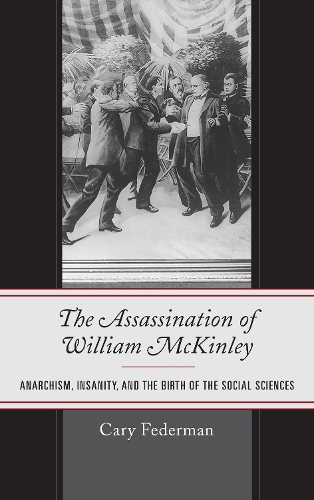
The Assassination of William McKinley: Anarchism, Insanity, and the Birth of the Social Sciences
(Hardback)
Publishing Details
The Assassination of William McKinley: Anarchism, Insanity, and the Birth of the Social Sciences
By (Author) Cary Federman
Bloomsbury Publishing PLC
Lexington Books
6th December 2017
United States
Classifications
Professional and Scholarly
Non Fiction
Terrorism, armed struggle
Crime and criminology
Politics and government
Sociology
B
Physical Properties
Hardback
312
Width 160mm, Height 236mm, Spine 27mm
590g
Description
This book is an examination of the assassination of President William McKinley by Leon Czolgosz, an American-born purported anarchist. This work offers a new and different way to approach historical crime stories. Rather than accepting the idea that Czolgosz was inherently dangerous because of his ethnic background or his obscure political statements, Federman argues, rather, that political relations, historical events, and the developing discourses in the natural and social sciences toward normal and pathological behaviors structured the meaning of the assassination. Federman proposes there are six ways to view an assassin, each corresponding to a social science. Consequently, each chapter of this manuscript examines a social science and its relation to the assassination. Overall, there are three purposes to this work: One is to examine the rise of the social sciences at the time of the assassination. The second is to explore the historical and political understanding of political violence; and the third is to examine the meaning of legal responsibility.
Reviews
Described in his time as 'an aggravated specimen from the insane borderlands,' the political assassin that sits at the center of this provocative new case study challenged the medical, social, and natural sciences to make sense of his desperate act. In his original analysis of the legal and medical issues surrounding the criminal and his crime, Federman proffers the existence of a borderland between medicine and law: a space in which the insane can be both dangerous and responsible. -- Joel Peter Eigen, author of Mad-doctors in the Dock: Defending the Diagnosis: 1760-1913
In this remarkable and original study, political scientist Cary Federman, examines the rise of the social sciences through the story of McKinleys assassin, Leon Czolgosz, and vice versa, he shows how the social sciences gave life to Czolgosz. What results is a fascinating rumination on understandings of criminal behavior, moral responsibility, and free will that is still relevant in the present day. -- Amy Louise Wood, author of Lynching and Spectacle: Witnessing Racial Violence in America
Through the unlikeliest of charactersWilliam McKinleys assassin Leon CzolgoszCary Federman chronicles the emergence of modern social sciences at the turn of the twentieth century. As sociologists, criminologists, psychologists, anthropologists, and other social scientists vied to demonstrate that their respective disciplines best explained the reasons for McKinleys killing, Czolgosz the volitional killer was transformed into Czolgosz the symbol of the zeitgeist. Federmans interpretation is a provocative challenge to those who maintain that social structure, not individual agency, explains violence and determines responsibility. -- Eric Rise, University of Delaware
Author Bio
Cary Federman is associate professor in the Department of Justice Studies at Montclair State University.
